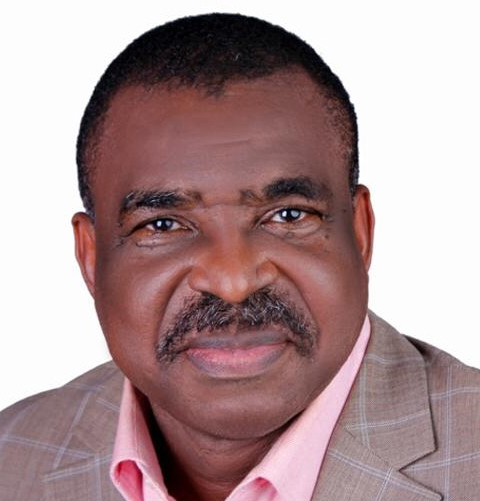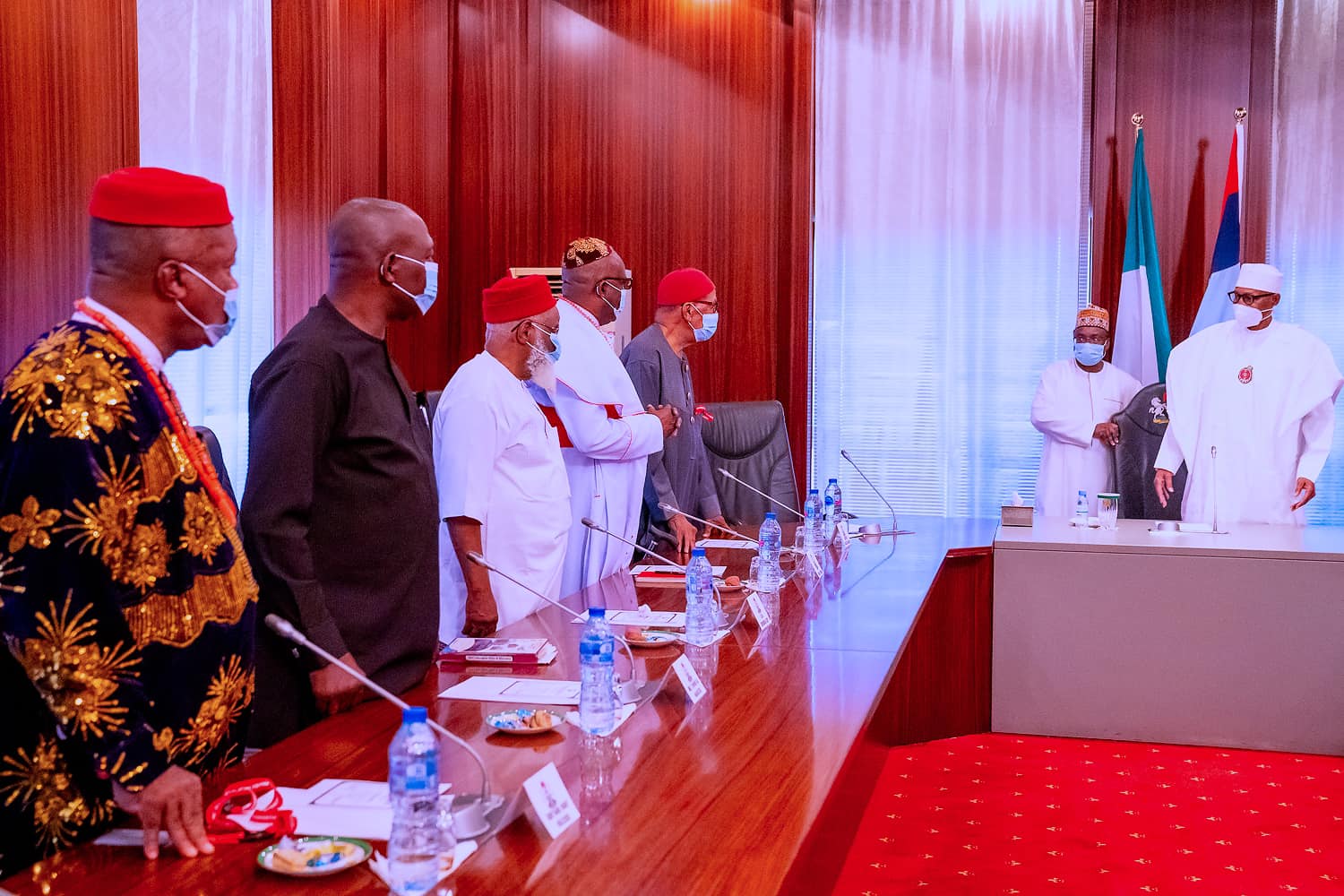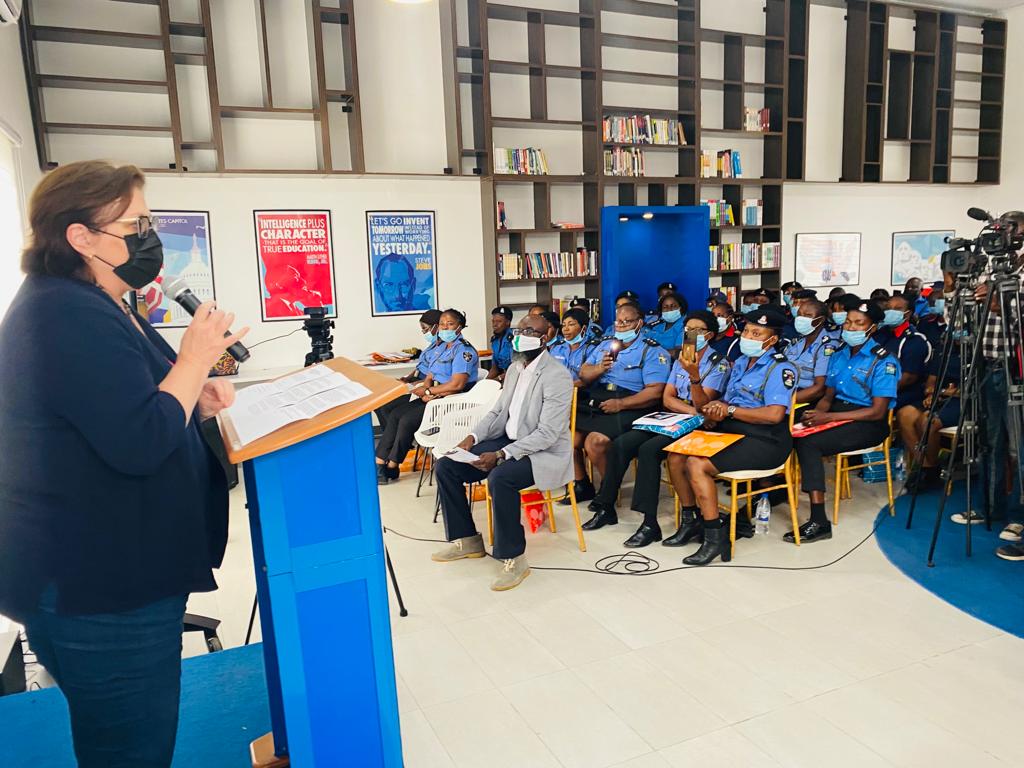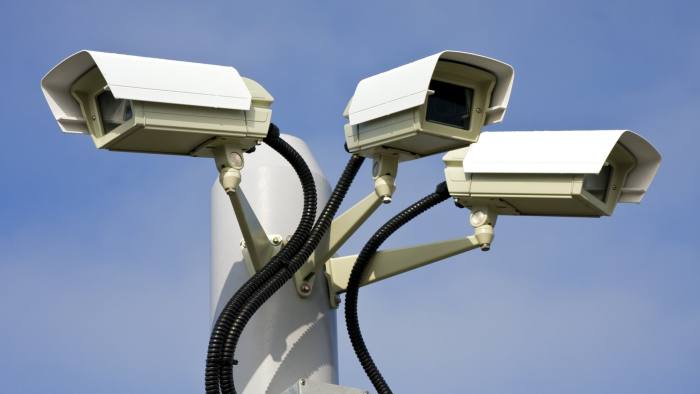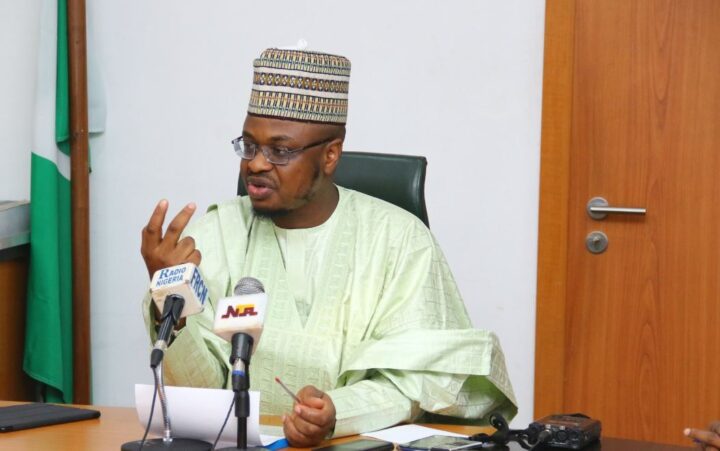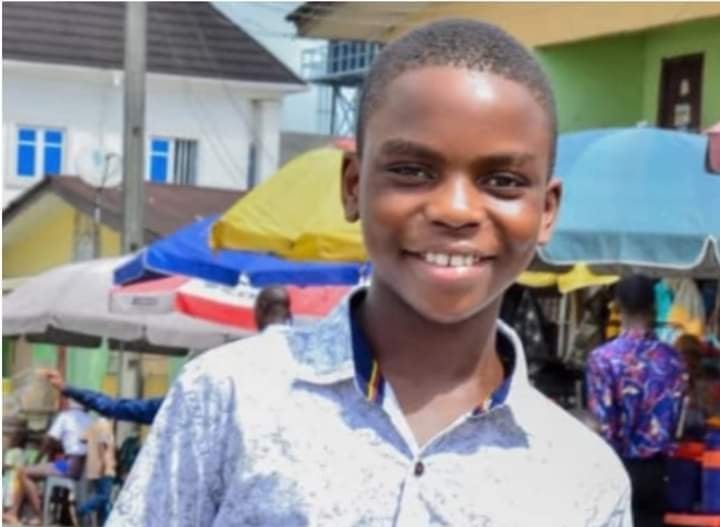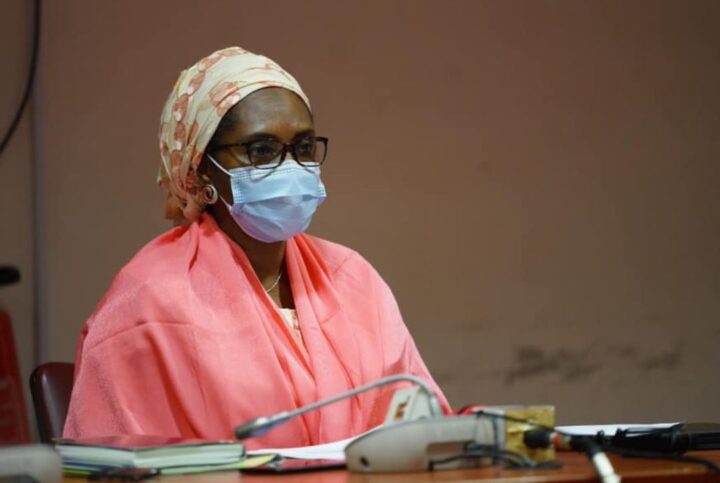In seeking an amicable end to the Igbo struggle for self-determination which started in 1967 when then eastern region governor, Chukwuemeka Odumegu Ojukwu declared the region as the state of Biafra, resulting in the unfortunate Nigerian civil war of 1967-70, and with the recent appeal by the delegation of Igbo elder statesmen, clergy and socio-cultural groups branded ‘Highly Respected Iggo Greats’ that visited President Muhammadu Buhari in Aso Rock on November 19; most Nigerians (of which I’m one) were optimistic that the end of secessionism and continued preservation of our country as one nation with one destiny was most likely, a fait accompli.
The positive prognosis is predicated on the hope that the Igbo nation was on the verge of burying the hatchet of the civil war by dropping their secessionist tendency that has devastated the eastern region economically and sociopolitically in the past several years, and a pursuit that has generally done grave damage to the fabric of unity in our dear country.
The request made by the leaders of Igbo nation for the forgiveness of the leaders of IPOB that are being prosecuted by the federal government for their alleged involvement in the violence against the symbols of authority such as abduction and murder of policemen, burning down police stations, and INEC offices, (deemed by perpetrators as action counter against authorities for perceived injustice of marginalization) was considered the potential game-changer that would facilitate the end of the prevailing atmosphere of anomie in that neck of the woods as some pundits like to characterize the violence-ridden eastern region.
The optimism is further underscored by the fact that President Buhari was very courteous to the Igbo leaders that visited him when against protocol, he requested that the leader, Amechi Mbazuluike, a 93 years old first republic parliamentarian and minister of aviation be seated in a chair, while he, (the president) remained standing with the others.
Advertisement
And the president’s dignifying gesture did not end with only the respect accorded the visitors as he, in a rare gesture of magnanimity, expressed willingness to consider the plea of the ‘Igbo Greats’ for the president to temper justice with mercy by freeing Nnamdi Kanu, IPOB leader currently facing charges for the crime of treason in the court of law.
It was heartening when after listening to the plea for leniency from the respected visitors, President Buhari confessed that although their request is very difficult for him to grant if he accedes to the entreaties, it would be the first time that he would be intervening in a judiciary process since he became president six years ago. With such a cheery and welcoming disposition of Mr president, it was not difficult to conjecture that a quick resolution of the over half-a-decade long civil disobedience by the separatist movement was in sight.
As we are all well aware, the federal government has been accusing the separatist group of masterminding the orgy of killings that was pervading the southeast such as the murder of fellow citizens, law enforcement officers, and also committing arson, (which the group denies) but for which they have been proscribed and its leaders are being prosecuted in the court of law.
Advertisement
In the light of what one can glean from president Buhari’s amiable disposition to the August visitors, a political solution appeared to be on the horizon.
Unfortunately, what had seemed like a home run (in a game of baseball, when a batter hits a ball that allows him to make a complete run of the circuit without an error is considered a victory) the peace-seeking men/women of goodwill in the beleaguered Igbo land, who had seen light at the end of the tunnel, are now being faced with the reality that the peace process may be at the risk of being truncated.
If peradventure, the pursuit of peace initiative is discontinued, it would be as a fall out of the abduction of three policemen and the gruesome murder of two of them allegedly by Eastern Security Network, ESN that is believed by law enforcement authorities, to be the military arm of IPOB.
Attorney General of the federation and minister of justice Abubakar Malami did not mince words about the mindset of government on the return of violence in the eastern region when he was featured by channels television in an interview program last Wednesday (1/12/2021): “Certainly, one thing I can tell you clearly is that the issue of pardon, out of court settlement or associated settlement is not right on the table.
“It is a bridge I enjoy crossing when I get there. I have unfortunately not got there yet.”
Advertisement
As the remote or direct factors responsible for the likely slow down of the policy of rapprochement by the authorities is the dastardly act of murdering two policemen in a very barbaric manner captured in a gory video clip circulating online, there is palpable fear that the crisis of secessionism may follow us as a nation into 2022 and perhaps beyond.
That gloomy prospect which is saddening can simply be surmised as one step forward, two steps backward in the quest to end the saga of secessionism, and possibly, the return of peace in Igbo land in particular, and Nigeria as a whole.
As such, since the emergence of the stomach-churning video online of a vicious act of savagery, (which I initially viewed without the audio and thought that it was footage from the make-believe world of Nollywood movies), my heart has been broken into smithereens.
The underlying reason for the heartbreak is the fact that the highly detestable act is clearly a violation of the peace accord between the elders and lPOB on one hand and presumably, the authorities in Abuja whom l had reckoned may not be averse to the return of peace in the eastern region and by extension, the country as a whole, hence the Attorney General and Mr President seemed to have been in acquiescence with the political settlement option.
Advertisement
Given the gravity of the crime of murdering active service policemen, it is not surprising that information and culture minister, Lai Mohammed has raised the tension in the polity by vociferously expressing the government’s outrage over the killing: “… the continued attacks on security agents as well as agencies of government by ESN/IPOB are diametrically opposed to the call in certain quarters for a political solution to the IPOB issue and wondered why those making such calls have yet to condemn the appalling murder of serving police officers”.
Admittedly, I am one of those making the appeal for a negotiated settlement for the separatist crisis and I am nonplussed, and beyond appalled by the ugly turn of events after my last article titled: Negotiation As Antidote Against Epidemic Of Separatism.”
Advertisement
In the referenced media Intervention, I had commended IPOB for rescinding its sit-at-home directive for the Anambra November 6 gubernatorial election to hold, while saluting the courage of the Igbo elders and leaders of thought that perhaps negotiated it and thereafter approached president Buhari for a political resolution of the crisis, just as l also extolled President Buhari for his willingness to consider the appeal by the Igbo leaders.
Despite the setback, I am encouraged that authorities in Abuja have not overreacted to the savage act of decapitating active police officers in a most horrific manner by taking reprisal actions in the manner that ex-president Olusegun Obasanjo did when the Nigerian military reportedly razed down Odi, a village in Bayelsa state, after a similar incidence of abduction and killing of 8 policemen on duty allegedly by criminal elements in Odi community.
Advertisement
The instant case of the recent murder of the abducted policemen in a gruesome manner by outlaws is a sad reminder of similarly heinous crimes against humanity committed by members of the Islamic State, ISIS who was infamous for engaging in the bizarre act of beheading their captives in their heydays until they were decimated mainly through drone attacks by the global anti-terrorism forces led by the US.
Even as my heart goes out to the families of the policemen murdered in cold blood, l have no doubt that the negotiation train that was on full steam and heading towards the station for a political solution to the rising tide of separatism and terrorism in our country, (which l still reckon would commence with the release of Nnamdi Kanu of IPOB and Sunday Igboho of Republic of Oduduwa from detention) would not be derailed.
Advertisement
The presumption above is underlined by the fact that IPOB has been working with Igbo cultural and religious leaders to bring the orgy of violence to an end in the Igbo nation as reflected by the agreement by the separatist group to lift their Stay-At-Home order in Igbo land before the Anambra state gubernatorial election on November 6, which apparently still subsists.
It is certainly not a mere happenstance that just before December 2, the date that IPOB leader, Kanu was billed to appear in court for the continuation of his trial for treason, the group reconfirmed their lifting of the stay-at-home order.
Presumably, those who perpetrated the dastardly crime of killing policemen on duty suspected to be ESN operatives or possibly members who might have gone rogue, do not have the approval of the authentic IPOB leadership which appears to be willing to allow diplomacy prevail over the resort to violence.
In the event that my presumption is correct, the onus would be on IPOB to remedy the precarious atmosphere occasioned by the abduction of three and murdering two active-duty policemen that have the capacity to roil the fragile peace or rupture the presumed armistice between the separatists and authorities in Abuja. Unarguably, it behooves IPOB leadership (if they did not authorize the attack) to track and apprehend with a view to bringing to justice, those that committed the heinous crime which is against the Nigerian state.
That is one sure way that the seemingly derailed train of political settlement can be put back on track.
When suspected Fulani herdsmen under the aegis of Miyetti Allah — the umbrella body of cattle herdsmen in Nigeria — were similarly accused of the crime of raping, maiming, and killing innocent Nigerians in farms and on the high ways around the country, the association was tasked with fishing out their members that had gone rogue by engaging in such atrocities that are clearly criminal.
It is to the credit of the herders association that they cooperated with law enforcement agents to distinguish themselves from the criminal activities of those now termed bandits which is the new terminology for the outlaws –terrorists, cattle rustlers, and kidnappers — alike involved in the atrocities that are now occupying right and centre of life in our very challenged country.
Like Miyetti Allah, IPOB is morally required to restore good faith in the arrangement that it has with those negotiating on its behalf for the release of its leader now in detention to facilitate efforts aimed at ending the crisis wreaking havoc on the Igbo nation specifically, and our country in general.
It is worth pointing out that things might have gone awry in the ranks of lPOB and MASSOB state of Biafra agitators resulting in the gory killing of the two policemen, as it is not uncommon for hardliners benefiting from a crisis to seek to thwart a peace initiative by throwing spanners into the wheel of progress.
For context, allow me to share a similar conflict resolution effort that kept getting sabotaged by those opposed to it. The intractable Palestinian and Israeli conflict in the Middle East readily fits the mold and therefore a typical example.
It may be recalled that Israel’s U.N. Ambassador Ron Prosor and Palestinian U.N. observer Riyad Mansour have been accusing each other’s countries of undermining the most U.S.-brokered peace talks.
In expressing his frustration about the failure to resolve the conflict, as a result of sabotage, to resolve the unending Palestinian/Israeli conflict, Mansur blamed the Israelis:
“Israel has maintained its rejectionist stance and persisted with its grave breaches, constantly reaffirming its role as occupier and oppressor, not a peacemaker,” “Once again, Israel has thwarted peace efforts.”
As a counterpoint, the Israeli envoy, Prosor also pinned responsibility for the suspension of peace negotiations on the Palestinians by making the following comment:
“The Palestinians pledge dialogue while fermenting hatred. “They promise tolerance while celebrating terrorists. And they make commitments almost as quickly as they break them.”
Prosor concluded by accusing Palestinian President Mahmoud Abbas of abandoning a chance to “tango with Israel” in favor of “waltzing off with Hamas.”
From the foregoing, typically, in the course of conflict resolution, preconditions for peace are more often than not breached as evidenced by the forging hot exchanges between the envoys of both countries that are feuding. But it is the duty of peacemakers to keep trying to get the feuding parties to compromise on some conditions in order to arrive at an amicable settlement satisfactory to all the parties to conflicts.
The reason for putting in perspective the Palestinian Israeli-conflict is that a similar scenario may be playing out against the peace initiative being driven by the emissary comprising of eminent Igbo cultural and religious leaders who recently visited President Muhammadu Buhari with the mission to appeal to his humane side in order to get the commander-in-chief of the armed forces of Nigeria to temper justice with mercy by opting for a political solution to the separatists’ imbroglio capable of causing more conflagrations in our country.
In the light of the above, it is by no means an exaggeration to state without fear of contradiction that the activities of the separatists and counter actions by law enforcement authorities have had debilitating, if not paralyzing effect on the good people of Igbo nation, just as it has also earned Nigeria a bad name in the global human rights community.
This perhaps explains why there appears to be equal motivation on both sides for the peaceful resolution of the over 50 years old grouse by the Igbos which resurfaced in the past six (6) years against the federal government for its alleged continuous insensitivity to the Igbo cause despite the post-war policy of Reconciliation, Reconstruction and Rehabilitation — the famous three Rs — that seem to have been implemented in the breach.
It is bad enough that our beloved country has the misfortune of being mentioned in the same breathe as the countries that an ex-president of the United States of America, George W Bush once referred to as being in the axis of evil. These are; Afghanistan, Libya, Syria, and Iraq, which are nations defined by terrorism that is fueled by religious extremism, manifesting in the massive killing of innocent people by Al Qaeda, lSIS, and Taliban that have transformed some of those countries, that were hitherto prosperous, into ground zero of poverty, and of the scotched earth proportions.
It is damning that Nigeria is now home to terrorist organizations similar to the ones in the Middle East — Boko Haram and ISWAP — that are equally turning our country into a killing field and therefore a sort of hell on earth.
The terrorist groups in our clime have become so ruthless that international security and human rights agencies are now comparing between the terrorists in the Middle East and those in Nigeria, to determine which ones are more vicious and are wantonly and recklessly shedding more blood.
And Nigeria-based terrorists seem to be winning the contest which is a testimony to how the sanctity of life has become so valueless to the merchants of death now haunting our countrymen and women like deranged ghosts from the pit of hell.
To add separatism or secessionism currently rocking our beloved nation to its foundation, to the list of demons responsible for our country being in the doldrums, is to put our country in the company of the likes of Spain – the leader in that orbit of infamy, where Basque region is the ground zero for separatists that have been agitating for self-determination since 1959.
That would certainly be another low for Nigeria if she fails to quench the raging separatist fire so that our country would not be categorized as a hotbed for separatist agitations like Sudan, Ethiopia and Spain.
For Nigeria, (a country that once prided herself as the leader of the black race) to maintain the status of a well-sought after bride, we have to do better than always being associated with negativity.
Our country got recognized worldwide and earned the enviable rank of being the leader of the black race after hosting ‘The Festival Of Arts And Culture, FESTAC’ in 1977 and the prominent role that she played in dismantling apartheid in South Africa, as well as intervening to end the civil wars in Liberia and Sierra Leone plus her peacekeeping efforts and interventions in other conflicts as they develop on the continent and worldwide.
As a nation, we have been unable to sustain the respect earned in 1977 for several reasons. And the worst of it is owed to religious insurgency, terrorism, banditry, and separatism which we are threatening to overwhelm and dismember the nation.
It is amazing that our country can avoid being branded a terrorist and separatist nation if our leaders are willing to dialogue with the aggrieved members of our society, as dialogue, conversation or negotiation is by no means rocket science, but less a commonsensical activity.
Disappointingly, engaging in dialogue or negotiation is an option that our leaders hardly consider in conflict resolution in our clime. Hence Boko Haram religious insurgency was allowed to spiral out of control in the north until it mutated into the multiple terror groups-ISWAP, bandits, killer herdsmen, etc now constituting a menace to society.
I shudder to contemplate the fear that the reckless killing of the two policemen by some outlaws may jeopardize the ongoing peace negotiation to end the crisis of Separatism in Nigeria through a political process beginning with freedom for IPOB leader Nnamdi Kanu that would thereafter pave the way for peace in the region and thus boost the emergence of Nigeria’s president from the South East in 2023.
The concern is shared by the elder statesman Amechi Mbazuluike who has cautioned the youths who allegedly executed the policemen to respect his age and give him the chance to return Igbo land to glory.
The First Republic Minister who, disheartened by the dastardly killing, is credited with the following comment:
“I plead with all agitating groups both known and unknown to give peace a chance for full restoration of security to the zone and the entire country.
“I am the only surviving minister of the First Republic and plead that my age should be respected.
“I should be assisted to make peace in the zone and country before I join my maker”.
Similarly, Prof Salihu Niworu who is the Director, Institute of Maritime Studies, Ibrahim Babangida University, Lapai, Niger State, in a recent media interview also made a poignant comment about resort to violence by Igbos when he pointed out that engagement in anti-government activities may constitute a stumbling block to the Igbo quest for the presidency of Nigeria in 2023:
“If presidential aspiration is by the barrel of gun, the North and southwest have more population than the South East.”
Thankfully, President Buhari, as a consequence of the killing of the policemen which is a violation of the relative peace in the region since the eve of Anambra state gubernatorial election about a month ago when IPOB lifted its sit-at-home order, has not, and is likely not to renege on his promise to take a compassionate look at the request made by the Igbo leaders that visited him to free Nnamdi Kanu from incarceration unconditionally.
That is quite commendable because if mr president had reacted harshly to the heinous crime of brutally killing policemen by unknown gunmen as had been anticipated, the negotiations would have gone up in flames and the nefarious ambassadors benefiting from the atmosphere of anarchy in the east arising from separatist agitations, would have been rewarded as opposed to being disappointed for their role in the act of sabotage.
Strikingly, both sides (separatists and law enforcement agencies alike) appear to be motivated to resolve the conflict, hence the apparently more accommodating attitude and stance of the authorities in Abuja.
In the words of Mark Twain — “History doesn’t repeat itself, but people often do—for better or for worse.”
It appears to me that the Buhari regime at this point in time, rather than repeating the negative aspects of the history of settling crisis of ethnic nationalism, is more amenable to adopting the strategy of dialogue and negotiation- the path that late Umaru Yar’adua applied in ending the militancy in the Niger delta.
It is a counterpoise to the option of relying on the barrel of guns which is the path that was toed by Obasanjo and former military ruler, General Sani Abacha before him.
With the benefit of history, since the 1914 amalgamation of the southern and northern protectorates of the British empire into what is now known as Nigeria, the crisis of ethnic nationalism has been in existence.
And conflicts arising therefrom have always been addressed through dialogue also known as negotiation via parliamentary meetings or conferences. After the negotiations, members of the Nigerian union accommodated each other by being sensitive to and respecting each other’s values.
Such meetings that were commonplace under the parliamentary system which our country practiced after independence, are hardly applied under the presidential system now in practice.
Perhaps that is the origin or trigger for the tension between the ethnic nationalities that are supposed to be federating.
Common sense dictates that a marriage that is devoid of communication between the husband and wife would be fraught with frictions that may develop into conflicts that may ultimately end up in a breakup.
It appears to me that the current governance system where there is hardly dialogue between members of the federating units, and even after a national dialogue is held, the recommendations are hardly implemented, may not be suitable or would not be the ideal governance system for a multi-culture and numerous religions country like Nigeria.
More so because, the people of Nigeria were forced into a marriage of convenience by imperialist Britain simply to facilitate their mercantile interests after Africa was forcefully appropriated by Britain following the 1884/5 Berlin, Germany conference where Africa was partitioned between Europeans.
To be fair to the British colonialists, they bequeathed to us the parliamentary system which in their judgement was the most suitable, perhaps owing to the ethnic and religious composition of our country post amalgamation that is similar to their system.
But along the line, 1979 to be precise, the presidential system was foisted perhaps without taking into account the peculiar ethnoreligious dynamics in our country.
Hence the fortunes of Nigeria that were on track to be at the forefront of the comity of progressive and prosperous nations and a country which the iconic Nelson Mandela once touted as the savior of the black race has been going down the hill.
It is a no brainer, therefore, to figure out that the struggle for separation or secession by any ethnic nationality from the Nigerian union on account of marginalization as Nnamdi Azikiwe, (the great nationalist) posited before independence, is a lazy proposition: but in the absence of dialogue, a break out of conflict may be inevitable.
There are fundamental reasons why the multiple ethnic nationalities that makeup Nigeria are not talking to each other as much as we should.
How can we talk to one another when the mantra in top government circles is: ‘The Unity of Nigeria Is Not Negotiable’.
Is it not curious that the slogan of Nigerian armed forces during the civil war that was prosecuted under then Head of state, General Yakubu Gowon is: “to keep Nigeria one is a task that must be done?”
Strikingly, it simply implies that: ‘Nigeria’s unity is not negotiable’. On its face value, it is not a bad message because it has a nationalistic fervor.
And given that it is a military credo, it is also understandable. But how does one explain the situation whereby our current crop of politicians have adopted and sustained the military mantra-Nigeria’s unity is not negotiable – 51 years after the end of the unfortunate and sad civil war -1967-70?
Common sense dictates that after the exit of the military that created it as a driving force for the prosecution of the war which is actually in furtherance of the task of keeping Nigeria one, it should have been jettisoned as soon the military exited the political space. But embarrassingly, that undemocratic, authoritative, and dictatorial policy is driven by the force of arms instead of dialogue which is supposed to be the currency and language of politics, has been allowed to persist by politicians who should know better.
To me it represents a failure on the part of our politicians who have taken over the leadership of our country, but have failed to jettison the totalitarian: Unity of Nigeria is not a Negotiable mantra, long after the military era, whose Standard Operating Procedure, SOP is by diktat, and which justifies their resort to force in their quest to keep Nigeria one.
Having mounted the saddle of leadership of our country and given that dialogue amongst the multiple ethnic nationalities that make up the country should have by now become the norm rather than the exception, it is appalling that such inter-ethnic conversations have not been deployed sufficiently, effectively, or efficaciously in the 51 years of post-Nigerian civil war to bolster unity amongst the multiple ethnic nationalities that make up our beloved country.
Let us take for instance the past 21 years of return to multi-party democracy. Only one National conference has been held. And that is the 2014 National Confab organized under Goodluck Jonathan’s watch as president (2010-2015).
Former information and culture minister, Jerry Gana recently weighed in on the matter by making a case for more dialogue between the federating ethnic nationalities in an address that he delivered as part of the activities marking Urhobo Progressive Union’s 90th birthday anniversary.
Here is how he put it:
“The last administration convened a national conference in 2014 and we agreed on some certain fundamentals to ensure justice and fairness. Unfortunately, when this government came in, they made a terrible mistake. They never touched that report and that is the problem.
“That’s why we are now saying we should start that conversation. We should talk to one another and assure one another of justice and fairness because, without equity, there can’t be peace. Without equity, we cannot be together.”
As if that scenario was not bad enough, the very well thought through recommendations of the 2014 Confab remain unimplemented over six (6) years into the eight (8) years, two terms, tenure of the president and the ruling party.
It should be noted that presidents, Olusegun Obasanjo (1999-2007) and Umaru Yar’adua (2007-2010) never organized any ethnic nationalities conference. Obasanjo is particularly more guilty of not focusing on solidifying unity amongst Nigerians via dialogue by the federating Nationalities given that he served two terms of eight years so he had an amble time.
Yar’dua served only two years before his sad demise, so he may be excused and Jonathan, who was on the throne for a total of 6 years convoked a conference, barely a year before the end of the fullness of his second term, (some say first term) and was foot-dragging on the recommendations of the Confab that he birthed which is why the onus to implement now lies in the hands of hands of the present political leadership.
Compare and contrast the single time a National Conference was convened in the past 21 years since the return of multi-party democracy in 1999 to the 1953-66 (pre-independence) period when major conferences between the ethnic nationalities were held at least four (4) times in lbadan, Enugu, Kaduna and London before the unfortunate military coup that ended the first republic-1966.
To cast light on Nigeria’s stunted growth despite her enormous potentials in human and material capital, let us compare our country which obtained her independence from British colonialists in 1960 to the United Arab Emirates, UAE which was formed in 1971 under the counsel of same Britain.
So, while Nigeria is 61 post-independence, UAE just celebrated the 50th anniversary of its founding.
That means, the UAE is ten years younger than Nigeria, yet she is light years ahead of our country in industrialization, adopting high technology and the prosperity of citizens.
According to the UAE office of the Historian, prior to 1971, the Trucial Sheikdoms of Abu Dhabi, Dubai, Sharja, Ajman, Umm al-Qaiwain, Fujairah, and Ras al-Khaimah were under a British protectorate. Fifty years after her coming together as a country, she is the toast of the world for the socioeconomic, infrastructural and dexterous management of its diversity.
While Nigeria has been caught up in the past 61 years in the shenanigans of ethnic supremacy, religious rivalry and insurgency, banditry and separatism, the UAE has been plotting its way into the club of countries with presence in the orbit with its recent deployment of a robot to planet Mars and building of infrastructure so robust that it appears to have trounced that of the UK, USA and France, put together.
While Nigerian authority’s predilection for proposing archaic policies such as RUGA and re-enacting millennium-old grazing routes/reserves for cattle is legendary; the UAE has got the whole world cooing about her stupendous wealth, adroitness of their leaders and the indomitable spirit of the Emirates which in terms of population is far less than delta state, that is a little less than six (6)million people.
And it is a testament to that country’s ingenuity that despite the fact that she is located in the Gulf region and nestled in the desert between Saudi Arabia, Oman and Iran, it is the world’s foremost tourism destination, while at the same time attracting hordes of business into the country because of its gigantic man-made seaports and some of the world’s biggest and busiest airports. Hence it is the undisputed market hub for practically all major multinational firms that have set up offices there for their the Middle East and Africa markets.
Now, can Nigeria be more Islamic than the UAE? Not by any chance.
Yet, while Nigeria is locked in religious extremism leading to deadly clashes between Muslims and Christians resulting in colossal human and property losses over the past decades, the UAE just entered a strategic arrangement with Israel, a Christian and Zionist country that is a world leader in technology, to set up technology-driven businesses in Dubai with a view to achieving technology transfer.
So, in a very profound way, the UAE places peace, progress and prosperity of Emirates above prebendal issues of religion or tribal rivalry, matters on which we dissipate colossal energy in Nigeria.
Like our country, the desert nation of UAE is made up of diverse nationalities and ethnic groups, yet the country is very stable and therefore a very much sort after investment haven for funds managers from Europe, (Sweden and other Scandinavian countries with huge sovereign wealth funds deployed as foreign direct investment, FDI ) and from North America – multinational corporations from the USA, Canada and Mexico.
That is in stark contrast with the volatility and instability of government and governance in Nigeria occasioned by religious and ethnic intolerance, which have prevented potential investors from pitching their tents in our country, (only a paltry $320m FDI in 2020) despite the existence of an abundance of God-given virtues, which is underscored by the fact that Nigeria is not only the largest market but also has the highest Gross Domestic Product, GDP in the continent of Africa.
Even as the United Arab Emirates, UAE presents a striking blend of ancient customs and modern technology, of cosmopolitanism and insularity, Nigeria is the antithesis of all the positive virtues that the 50 years old Arab country represents because, regrettable, our leaders’ policies are anachronistic.
At the risk of appearing to be calling out my country and waxing lyrical about the great accomplishments of another country’s strategic and visionary leaders, it is with all sense of responsibility that l am denouncing the apparent myopic world view of our leaders whose policies are mired in pre-historic and archaic idiosyncrasies.
This is why l would like to recommend that president Buhari models Nigeria’s development after the UAE’s extraordinarily captivating system simply because it is a universally acknowledged success story and he too can attest to the wonder in the desert which Dubai, in particular, has been transformed into.
The advice is also especially apt now since mr president has just returned from a visit to the UAE’s months-long EXPO 2020, where she exhibited her scintillating accomplishments in the 50 years of its formation as a united country of seven Emirates independently optimizing and reaping the benefits of the natural endowments endemic in their locations.
One can imagine that if the UAE were to be Nigeria, all the other Emirates would literally run pipelines into Abu Dhabi to suck all the oil endemic to that region as all the states in Nigeria appear to be doing by relying solely on the oil/gas in the Niger Delta region for sustenance instead of exploiting other natural resources available in their localities as the UAE is doing with Dubai as the hub for trade, industry and tourism and the other Emirates like Ras Al-Khaimah, etc being centers for agricultural production and various activities in which they enjoy a comparative advantage.
Put succinctly, why can’t Nigeria adopt a development strategy similar to UAE’s proven formula? The Niger delta can be like Abu Dhabi as an oil/gas hub, Lagos as commercial, industrial and financial center like Dubai and the northern region would be like Ras Al-Khaimah for agriculture and the eastern region can be the artisan and engineering hub like the other Emirates like Sharjah in the UAE.
I am of the conviction that such might have been the vision of the British colonialists that modeled our country structure after their own parliamentary system at independence in 1960. And it was working well for us until some smart Alecs with guns, (six years after the British left our destiny in our hands in 1960-66) derailed the train of progress via a mindless coup detat and six (6) months after that sad event, another set of the same spoilers with guns, further muddied the waters via a counter-coup, and thus consolidated the damage already inflicted by the first set of military adventurists by adopting the unitary system of government disguised as federalism.
Over 50 years after the first coup that started a civil war, the military incursion into politics remains the main culprit for Nigeria’s arrested development.
Is the quest to reverse the mistakes made by the military (wittingly or unwittingly) in 1966 and subsequently consolidated by the politicians who took over from them, not what the current clamor for restructuring is all about?
The bottom line of this piece, (which is actually a plea) is that our political leaders should strive to more be religion and tribe neutral. That is one sure way that we can have the chance to be like the UAE.
More liberalism and less totalitarianism is one sure way that as a country, we can optimally harness our latent potentials to enable us collectively attain the destined level of prosperity, from which we are currently very far from achieving, due in large part to the dearth of innovative and dynamic leadership vision of the caliber that has been deployed by the leaders of the UAE that has enabled them to turn desert into a paradise.
In conclusion, l am optimistic that my fervent plea for our leaders to, like true patriots resolve to rise above ethnic and religious considerations and resolutely pursue a political settlement of the crisis of separatism and terrorism threatening to wreck the nation, and adopt the UAE development model.
That would facilitate the harnessing of the full potentials of our beloved country that is currently hamstrung by the pursuit of inanities by our leaders as earlier catalogued.
Hopefully, my fervent apple will not fall on deaf ears.
Without a scintilla of doubt, it is clear that the urgency of seeking innovative ways to put our country together can not be denied, as it is increasingly looking like the subject of the kindergarten rhyme, Humpty-Dumpty that sat on a wall, had a great fall and all the kings men could not put it together.
If the UAE leader Khalifa Bin Zayed Al Nayan and his co-rulers of the 7 Emirates could corporate with each other to cobble together an originally disparate people from the seven (7) Emirates that banded together in 1971 to rise meteorically to the level of being the envy of many nations: l do not see why Nigeria and Nigerians should continue to be mentioned or be grouped together with wretched countries or be at the bottom of the rung of the comity of developed nations.
For the sake of emphasis, were it not for the mismanagement of our diversity by our leaders to the extent that the twin monsters of secessionism and terrorism have been unleashed with ethnic nationalism and religious extremism as the propellant, our country would not be in such a sorry state.
We need no soothe sayer to enlighten us on the fact that a combination of religious insurgency, ethnic supremacy and separatism that have collectively and significantly impaired the productivity of our countrymen and women, (hence we are currently punching below our weight) should not be allowed to fester, more so because they are preventable and avoidable.
And what a glorious country Nigeria would have been, were it not for the mismanagement of our diversity- a condition which leaders in other climes such as the UK, Switzerland, Canada and UAE that are also comprised of diverse people are successfully managing and harnessing for the beneficial interest of the citizens of the nations.
Now that our leaders have been fully apprised of what has been ailing us as a nation, and as we prepare to enter the year 2022, hopefully, they would make a new year resolution to be more flexible and responsive to the stimuli of progress through dialogue and negotiations amongst the multifarious ethnic nationalities and religions for the common good and prosperity of all.
Magnus Onyibe, an entrepreneur, public policy analyst, author, development strategist, alumnus of Fletcher School of Law and Diplomacy, Tufts University, Massachusetts, USA and a former commissioner in Delta state government, sent this piece from Lagos.
Add a comment
